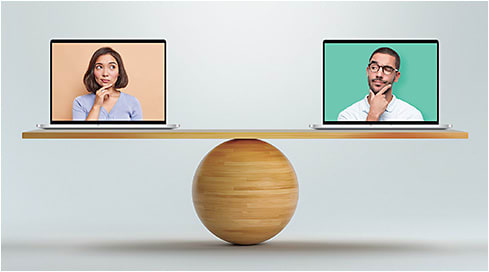Visibly, which bills itself as “the world’s first online eye test,” has recently been cleared by the FDA for use as visual acuity test.
To weigh in on whether adopting online eye tests could be helpful for practices, Aaron Neufeld, OD, of California’s Los Altos Optometric Group, and Dorothy Hitchmoth, OD, in private practice in New London, N.H., give their perspective on the benefits of such technology.
REACHING A "CLOSED OFF" POPULATION
One advantage of online tests for Dr. Neufeld is that they can reach sections of the population who may otherwise have never had an eye exam. “The ability to give some semblance of both VA testing and possibly accurate spectacle prescriptions present a massive opportunity to the optometric industry. Accessibility, awareness and ease of use are three main reasons why 10% of the US population has never had an eye exam,” Dr. Neufeld says. Being able to reach this “closed off” population can lead to them scheduling visits for comprehensive eye exams in-person, he adds.
DOCTOR SUPERVISION
With proper supervision, Dr. Hitchmoth says she sees online tests as offering some use to practices.
“If an online test is used by a doctor to screen individuals who have had a live comprehensive examination that included a medical history, health analysis for risks that might affect the eyes, a refraction and other standard tests, such as a dilation of the pupil and examination of the internal eye, then the tool might help identify people who have vision changes, and therefore possible eye diseases, before their next scheduled live eye exam,” says Dr. Hitchmoth.
Online testing could also be useful in cases of triaging patients in busy practices, or in cases where medical risk analysis reveals a patient may not need a complete eye exam before obtaining new lenses, she adds.

NO REPLACEMENT FOR AN EYE DOCTOR
While online tests do offer some advantages, overall both Drs. Hitchmoth and Neufeld agree that any digital eye test cannot replace an in-person visit to a professional.
“Most eye doctors and professional organizations, such as the American Optometric Association and American Academy of Optometry, do not recommend online tests without an examination and guidance by a doctor who has examined you directly in person,” says Dr. Hitchmoth, as an in-person exam allows an OD to gauge current test results against previous ones, and gives the OD a chance to check for sight-affecting conditions such as diabetes, which patients may not be aware they have until it begins affecting their vision. While Visibly asks patients if they have medical conditions such as diabetes, it cannot check them for the condition, says Dr. Hitchmoth. “This makes using the application as a stand-alone test ill-advised.”
Dr. Neufeld states that, currently, he doesn’t see the online test as offering any savings in terms of time or money for his practice as “our methods of testing both visual acuity and refraction have been honed over decades from the in-person doctor-patient experience.” OM
Editor's Note: As laws from state to state vary and are often revised, we strongly recommend you become familiar with your state’s current laws and requirements regarding online vision testing.



